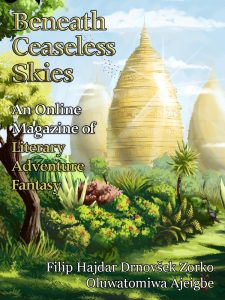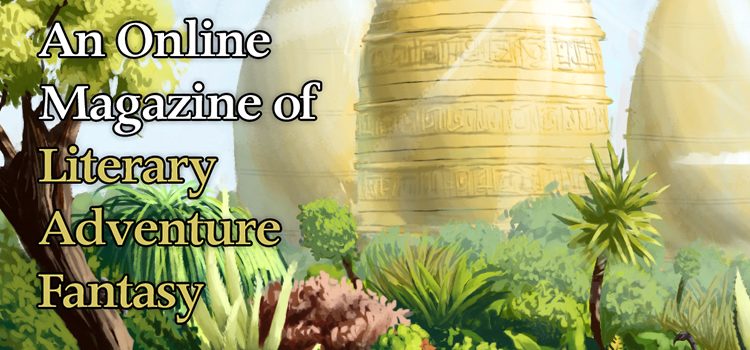Charles Payseur Reviews Short Fiction: Drabblecast, Zooscape, Worlds of Possibility, and Beneath Ceaseless Skies
 Drabblecast 3-4/23
Drabblecast 3-4/23
Zooscape 4/23
Worlds of Possibility 4/23
Beneath Ceaseless Skies 4/20/23, 5/4/23, 5/18/23
Drabblecast has been busy, with new stories in March and April, and the second issue of their publication The Tentaculum. Inside, “Personal Best” by Michael Bettendorf tells the visceral and unsettling story of a young man whose parents are really into his football prospects – or so it seems. Really, they are into their own dashed dreams, pushing their children to live up to the things they wanted, even if it means sacrificing their health or their lives. Which is how the narrator became an only child following the death of his brother Kyle, and it’s a fate he can see for himself as his parents force him to drink special shakes and eat special food, all in an effort to get his team to win and win big. Bettendorf plays with familial expectations that quickly cross the line between intense and child abuse, and the story goes to some very grim places that fans of body horror will no doubt want to check out. It makes for a skin-crawling but fascinating take on competition, athleticism, and horror.
April’s Zooscape is full of furry speculative fiction, and I found myself drawn to a pair of stories featuring old crows. “Overly Familiar Familiars” by S. A. Cole unfolds as a kind of origin story told by one crow to younger generations, about how their people settled and then how the humans arrived and threw everything into uncertainty. And how one human in particular, a witch, came to a kind of understanding with the crows, the two helping each other out, and how when the witch had a daughter, their extended family seemed complete. Except that, in time, the daughter also adopted a familiar, a cat, and that ushered in a rather bleak time for the crows, when their connection to the witch was strained, and everything seemed on the verge of falling apart. The narrator’s voice is strong and captivating, and Cole captures in two creatures who are often viewed as aloof loners, cats and crows, a strange but strengthening bond that might just save them both when trouble comes slithering near. Patricia Miller keeps the focus on crows in “A Season’s Lament”, which finds a wizened crow who loses her mate turning to study and teaching in her later years. Trading stories and knowledge, she travels and learns the languages of other birds and creatures more different still, until she comes across something she’s never seen before – a merman. The last of his kind, he holds sorrow in his heart like the echoes of a song that will never more be sung. Unless, that is, someone else learns that song and keeps it alive. Miller reveals a world where knowledge is lost every day due to pollution and habitat destruction, where the old sea crow uses the only tools she has to try and fight back against the tide washing away the beauty lost to extinction – empathy, patience, and a desire to learn. It’s beautifully told, and hauntingly resonating.
The April Worlds of Possibility features a mix of stories and poems, including “Cloud Zoo” by Moriam E. Kuye, which finds a couple trying to relax and leave their worries behind. As parents of a young child, though, it’s not exactly easy, though it might be necessary for their mental health and their relationships. The speculative element of the story isn’t that two parents get a night to themselves, though, but how they relax, taking to the sky and into the clouds to change shape, play, and find a place to explore their joy unguarded. Kuye digs into the complex need for release and relaxation, for play and pleasure, amid the necessities of adult life with its worries, and especially for parents, who must deal with the desire to keep their children safe in a deeply unsafe world. Lynne Sargent contributes a poem to the issue, and “Magic Systems for the Future” looks at assumptions about magic and believability through a rather interesting examination of our own world. The piece begins with the often-repeated idea that any sufficiently advanced technology is indistinguishable from magic, and that climate change might be the balance that makes that magic believable. Which opens up a whole conversation about how people and especially speculative fiction readers treat fantasy and magic, finding systems that have some sort of cost, some great drawback to magic more “true” than those where magic is, well, just magic, defying rules or quantification. And buried within that is a kind of fatalism where grimness becomes shorthand for authenticity. Sargent evokes and challenges that, pushes back against the impulse that sees futility as inherently realistic. And it’s a wonderful read. Finally, Avra Margariti’s “Heirloom” tells the story of Myrto, a dryad living a rather secluded life with her mother and grandmother, both of whom have suffered at the hands of humans driven by prejudice and fear. Myrto is encouraged to stay home, told again and again that her mother and grandmother only want to spare her the pain they experienced, so that she can add to the quilt that tells the history of their family in a way not dominated by hurt. Cut off from the world, though, Myrto finds that she is also kept from joy, from love, from the possibility that things might be different for her, might be better. Margariti does careful and lovely work in showing the push and pull of historical violence and the deep rewards that can come from trusting and trusting in other people. It’s not that Myrto’s family is wrong about the dangers, but in their focus on pain they risk losing sight of the kindnesses and joys they have experienced. It closes the circle opened by Kuye’s earlier story, showing that parents who can’t release their worry damage not only themselves, but the children they were trying to protect as well.
Beneath Ceaseless Skies closed out April with a powerful issue focused on people in love, and whose love seems to pose a threat – to themselves and to their societies. In Filip Hajdar Drnovšek Zorko’s “The Cuckoo of Vrežna Mountain”, Emre is in love with his best friend, Ivor, but a difference in religion means that their union is all but impossible. So when Ivor goes to his goddess to receive word of who he is to marry, Emre, whose own gods are dead, is left dreading what happens next. For good cause, it turns out, though not in the way he expected. The story twists and turns, revealing surprise after surprise – some good, and some decidedly not. Zorko fills the story with emotion and longing, Emre’s hopes riding the razor’s edge between fulfillment…and doom. It’s a richly imagined story with a beautifully accomplished romance at its heart. And it pairs well with Oluwatomiwa Ajeigbe’s “A Witch’s Transition in The City of Ghosts”, in which Fela has never really been accepted as a witch in the city where witches won a great battle against a demon and secured for themselves a place to found a renowned academy. It’s not her social skills that make Fela an outcast, though, nor her magical abilities. Rather, the witches don’t want to accept her because she’s transgender, and so she finds her own acceptance outside the walls of the academy, and in the arms of a dryad who lives in the forest there. When the academy predicts that such a relationship might destroy their order, though, the witches try to leverage acceptance as a weapon to separate Fela from her lover. Ajeigbe shows the ways that dominant groups withhold and offer protection and affirmation, always with strings attached – and always able to be rescinded should it be convenient. And through Fela it becomes clear that for the outcasts there is a greater strength in rejecting dominance and seeking instead trust and genuine connection in defiance of convention.
Moving into May, Beneath Ceaseless Skies’ first issue of the month was focused on family, corruption, and destruction. The second issue then moved the thematic focus to families fleeing violence and conflict, and daughters seeking to live up to the love and care of their mothers, who had to make terrible decisions to try and stay alive and safe. M.S. Dean tells the story of a mother and daughter separated in a city of towers in “Only Kings and Doves”. The mother, a surgeon in her own land, had to flee with her daughter to the city of their conquerors, hoping to live as refugees. But the city is grim, and the mother’s skills make her and her daughter a target. When the mother goes missing, it’s up to the daughter to find her, to find a way to rise above the squalor and betrayal around her. Dean doesn’t focus on either revenge or escape, though, settling instead of a hunger for reform, and a fragile but resilient faith that the world is not without justice or hope so long as people keep trying to do what is right.
Recommended Stories
“A Season’s Lament”, Patricia Miller (Zooscape 4/23)
“Heirloom”, Avra Margariti (Worlds of Possibility 4/23)
“The Cuckoo of Vrežna Mountain”, Filip Hajdar Drnovšek Zorko (Beneath Ceaseless Skies 4/23)
“A Witch’s Transition In The City of Ghosts”, Olumatomiwa Ajeigbe (Beneath Ceaseless Skies 4/23)
Charles Payseur is an avid reader, writer, and reviewer of speculative fiction. His works have appeared in The Best American Science Fiction and Fantasy, Lightspeed Magazine, and Beneath Ceaseless Skies, among others, and many are included in his debut collection, The Burning Day and Other Strange Stories (Lethe Press 2021). He is the series editor of We’re Here: The Best Queer Speculative Fiction (Neon Hemlock Press) and a multiple-time Hugo and Ignyte Award finalist for his work at Quick Sip Reviews. When not drunkenly discussing Goosebumps, X-Men comic books, and his cats on his Patreon (/quicksipreviews) and Twitter (@ClowderofTwo), he can probably found raising a beer with his husband, Matt, in their home in Eau Claire, Wisconsin.
This review and more like it in the July 2023 issue of Locus.
 While you are here, please take a moment to support Locus with a one-time or recurring donation. We rely on reader donations to keep the magazine and site going, and would like to keep the site paywall free, but WE NEED YOUR FINANCIAL SUPPORT to continue quality coverage of the science fiction and fantasy field.
While you are here, please take a moment to support Locus with a one-time or recurring donation. We rely on reader donations to keep the magazine and site going, and would like to keep the site paywall free, but WE NEED YOUR FINANCIAL SUPPORT to continue quality coverage of the science fiction and fantasy field.
©Locus Magazine. Copyrighted material may not be republished without permission of LSFF.








